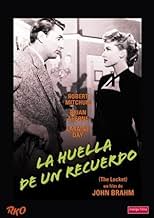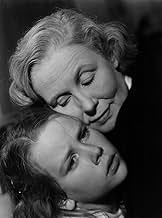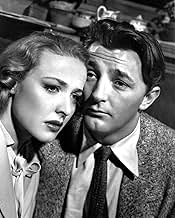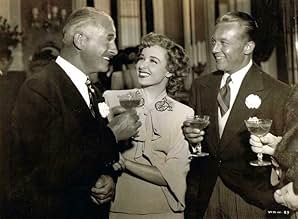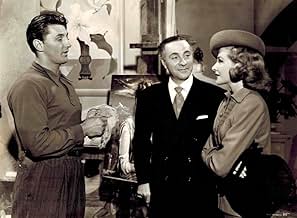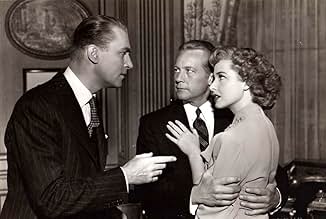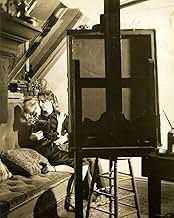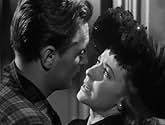NOTE IMDb
7,1/10
3,4 k
MA NOTE
Ajouter une intrigue dans votre langueJust before his wedding, the bridegroom hears a complex tale painting his lovely bride as devilish and unbalanced.Just before his wedding, the bridegroom hears a complex tale painting his lovely bride as devilish and unbalanced.Just before his wedding, the bridegroom hears a complex tale painting his lovely bride as devilish and unbalanced.
- Réalisation
- Scénario
- Casting principal
- Récompenses
- 4 victoires au total
Helene Thimig
- Mrs. Monks
- (as Helen Thimig)
Mari Aldon
- Mary
- (non crédité)
Polly Bailey
- The Cook
- (non crédité)
Avis à la une
Brahm's intricately constructed film is based on the obvious conceit of a locket: in psychoanalytical terms, it symbolises repressed memory and of the 'opening up' of hidden psychosis. In a filmic sense of course, The Locket itself is a cinematic 'locket', the flashbacks within flashback structure reflecting the secret enclosure typical of such a piece of jewellery.
In fact I can't think of another film that takes this much commented narrative technique to such extremes. Mitchum of course was well used to playing heros faced with abnormal feminine psychology. He faces similar femme fatales in Preminger's 'Angel Face' for instance and in Farrow's 'Where Danger Lives' - all made at around the same time (end 40's, start of 50's). This may reflect something of the obsession that Hollywood had with cod Freudianism just as much as noir convention, but there is no doubting that Mitchum's peculiar manner as an actor, his doe-eyed sleep-walking acting style, made his starring excursions into the dangers of the subconscious peculiarly effective.
Brahm, one of Hollywoods most neglected directors at least for the work that he did at this time in his career, makes the somewhat over- stretched structure of the film work, pun intended, like a dream. Nancy's final walk to the altar, immediately before her mental and psychic collapse, although necessarily melodramatic, is very effective version of a personal calvary and she seems stunned and trance like. In retrospect, of course, it is easy to see how the whole of the preceding film has been leading up to this sequence, (just as how the flashback structure of the film reminds one in passing of 'Citizen Kane') but the sound and vision montage is still powerful.
By setting the bulk of the film in flashback, Brahm places it in the past - or, more precisely, in the imaginatively reconstructed past, and it is this dream-sense that retains a powerful grip on the viewer as events unfold. This almost hallucinatory sense, together with a feeling of 'drifting with fate', marks out some of the greatest noirs and B-mysteries made at this time and is what makes this film still very watchable today.
A 'Locket' well worth looking into.
In fact I can't think of another film that takes this much commented narrative technique to such extremes. Mitchum of course was well used to playing heros faced with abnormal feminine psychology. He faces similar femme fatales in Preminger's 'Angel Face' for instance and in Farrow's 'Where Danger Lives' - all made at around the same time (end 40's, start of 50's). This may reflect something of the obsession that Hollywood had with cod Freudianism just as much as noir convention, but there is no doubting that Mitchum's peculiar manner as an actor, his doe-eyed sleep-walking acting style, made his starring excursions into the dangers of the subconscious peculiarly effective.
Brahm, one of Hollywoods most neglected directors at least for the work that he did at this time in his career, makes the somewhat over- stretched structure of the film work, pun intended, like a dream. Nancy's final walk to the altar, immediately before her mental and psychic collapse, although necessarily melodramatic, is very effective version of a personal calvary and she seems stunned and trance like. In retrospect, of course, it is easy to see how the whole of the preceding film has been leading up to this sequence, (just as how the flashback structure of the film reminds one in passing of 'Citizen Kane') but the sound and vision montage is still powerful.
By setting the bulk of the film in flashback, Brahm places it in the past - or, more precisely, in the imaginatively reconstructed past, and it is this dream-sense that retains a powerful grip on the viewer as events unfold. This almost hallucinatory sense, together with a feeling of 'drifting with fate', marks out some of the greatest noirs and B-mysteries made at this time and is what makes this film still very watchable today.
A 'Locket' well worth looking into.
I'm correcting a mistake in the previous post by Limsgirl of Massachussetts. That was NOT the mother of Olivia de Havilland and Joan Fontaine who played the cruel woman who gives Nancy (Laraine Day) the locket. That woman was actress KATHERINE EMERY who played many "evil" or mean women in supporting roles. Lilian Fontaine had a brief nondescript role as a wealthy woman and made no impression whatsoever--she never had a really good role on screen, appearing briefly in THE LOST WEEKEND (Jane Wyman's mother) and IVY (as Joan Fontaine's friend, Lady Flora). LET'S GIVE CREDIT WHERE IT'S DUE--and applause for Katherine Emery as the cruel woman who has an immense effect on Nancy's life.
This is a great movie! I wasn't expecting to like it but boy, was I in for a suprise. The flashback within a flashback within a flashback (Is there another one?) theme is so great and is never the least bit confusing. Laraine Day, Brian Aherne, Robert Mithchum, and Gene Raymond give great performances in this thriller.
Just before his wedding to the beautiful and carefree Nancy, John Willis is visited by Doctor Harry Blair who informs him that he knows the real Nancy and warns the doctor not to make the same mistake as him by marrying her. He tells her the story of how he had just married Nancy when a man called Clyde turned up in his office and told him a story about how he had met Nancy and had got drawn into her world of deception.
Shunning conventional structure is always a risk and in this film it is one that it takes as we have a story being told by Blair that is basically about him being told a story by Clyde. This makes for an interesting approach especially since the stories are both told by her dumped lovers. In this regard we're not sure what is true and what isn't and, while the stories engage on one level, I was conscious of the fact that they were telling and not necessarily facts (a trick Usual Suspects would later repeat to great praise). Existing within the minds of the characters, the story is interesting and is all the better at the end for it. For many viewers the story-telling approach will be a little slow and I times it did drag a bit but mostly it comes together and works as something different and interesting.
The cast are roundly good although they take second fiddle to the script and the ideas of director Brahm (who produces some clever ideas in Nancy's bridal march). Aherne is a bit too stiff in the role where really I wanted him to display a bit more range. Mitchum is good in his role but it wasn't the sort of thing I was used to seeing him in and he has been much better elsewhere. Day takes the main role of Nancy and does well with it she is part of the reason we're not sure what is true and what isn't and she convinced me that she didn't know either. She has plenty of nice touches as well as one or two very strong moments. Like I said though, this wasn't a great actors film but nobody was less than good.
Overall this is an interesting and different film that takes a risk by stepping back to flashback within flashback but mostly pulls it off. The story format might be a little testing on the patience (hearing about something implies a lack of action in the time where we are after all the audience spent the film in the Willis study) but the material is worth it and, once back in the present, everything comes together nicely. Worth seeing for being a different style of drama from the period.
Shunning conventional structure is always a risk and in this film it is one that it takes as we have a story being told by Blair that is basically about him being told a story by Clyde. This makes for an interesting approach especially since the stories are both told by her dumped lovers. In this regard we're not sure what is true and what isn't and, while the stories engage on one level, I was conscious of the fact that they were telling and not necessarily facts (a trick Usual Suspects would later repeat to great praise). Existing within the minds of the characters, the story is interesting and is all the better at the end for it. For many viewers the story-telling approach will be a little slow and I times it did drag a bit but mostly it comes together and works as something different and interesting.
The cast are roundly good although they take second fiddle to the script and the ideas of director Brahm (who produces some clever ideas in Nancy's bridal march). Aherne is a bit too stiff in the role where really I wanted him to display a bit more range. Mitchum is good in his role but it wasn't the sort of thing I was used to seeing him in and he has been much better elsewhere. Day takes the main role of Nancy and does well with it she is part of the reason we're not sure what is true and what isn't and she convinced me that she didn't know either. She has plenty of nice touches as well as one or two very strong moments. Like I said though, this wasn't a great actors film but nobody was less than good.
Overall this is an interesting and different film that takes a risk by stepping back to flashback within flashback but mostly pulls it off. The story format might be a little testing on the patience (hearing about something implies a lack of action in the time where we are after all the audience spent the film in the Willis study) but the material is worth it and, once back in the present, everything comes together nicely. Worth seeing for being a different style of drama from the period.
The Locket (1946)
Well, when you have a post-war movie with Robert Mitchum at his young prime, you can't go wrong.
The star (or starlet, as they used to say) is actress Laraine Day playing Nancy, and she pulls off a charming, attentive, smart perfect woman. A bride to be, in fact. The movie starts with people arrive to a high class wedding. Mitchum shows up via flashback (classic film noir stuff). In fact, there is a flashback within a flashback within a flashback (4 levels) and it's sort of fun.
There are some great lines like, "If you'e lucky you can afford to be nice." But some of the dialog, and maybe the plot overall, is a hair stiff at times.
Director John Brahm is not well known, but his "Hangover Square" the year before is really great. And this one shows a consistent sense of storytelling and drama with highs and lows if not always fully developed characters. The key character is Nancy, who uses her charm to win over the audience as well as the men around her in the plot. Day plays her role perfectly—swiveling sweetness against a just perceptible insincerity. She's a terrific liar.
Which brings me back to Mitchum, who is good but seems to be reading rehearsed lines too often. I think there was supposed to be chemistry between Day and Mitchum, but it wasn't there, even though they both look terribly good.
Though it has a noir-like flavor, this strikes me as a straight up melodrama overall, and with soaring music and lots of dramatic lighting there is no way to not get absorbed in it. There are some short but well done scenes of London during the war (bombs and blackouts).
A well done and lesser known good one. And a fun curiosity—the crazed music box music that denotes an uneven state of mind is the same as that used in the "Bad Seed."
Well, when you have a post-war movie with Robert Mitchum at his young prime, you can't go wrong.
The star (or starlet, as they used to say) is actress Laraine Day playing Nancy, and she pulls off a charming, attentive, smart perfect woman. A bride to be, in fact. The movie starts with people arrive to a high class wedding. Mitchum shows up via flashback (classic film noir stuff). In fact, there is a flashback within a flashback within a flashback (4 levels) and it's sort of fun.
There are some great lines like, "If you'e lucky you can afford to be nice." But some of the dialog, and maybe the plot overall, is a hair stiff at times.
Director John Brahm is not well known, but his "Hangover Square" the year before is really great. And this one shows a consistent sense of storytelling and drama with highs and lows if not always fully developed characters. The key character is Nancy, who uses her charm to win over the audience as well as the men around her in the plot. Day plays her role perfectly—swiveling sweetness against a just perceptible insincerity. She's a terrific liar.
Which brings me back to Mitchum, who is good but seems to be reading rehearsed lines too often. I think there was supposed to be chemistry between Day and Mitchum, but it wasn't there, even though they both look terribly good.
Though it has a noir-like flavor, this strikes me as a straight up melodrama overall, and with soaring music and lots of dramatic lighting there is no way to not get absorbed in it. There are some short but well done scenes of London during the war (bombs and blackouts).
A well done and lesser known good one. And a fun curiosity—the crazed music box music that denotes an uneven state of mind is the same as that used in the "Bad Seed."
Le saviez-vous
- AnecdotesNorma Barzman's lengthy treatment for this film, which Sheridan Gibney revised into a screenplay, was inspired by a true event which was recounted to her by financier George Peabody Gardner and his sister Belle. When younger, the Gardners eschewed their aristocratic upbringing partly in reaction to an incident in their youth: As children they became friendly with the daughter of the family's housekeeper. It transpired that the daughter was wrongly accused of stealing a locket, leading to the firing and departure of the housekeeper and her daughter. Years later, they learned that the daughter suffered from depression and was implicated in a theft, a consequence for which the Gardners felt their family was partly responsible.
- GaffesAmerican ambulances, shown driven with left-hand drive, were not used in wartime London.
- Citations
Norman Clyde: I don't take money for nothing. I'm not conducting a class so the parasitic rich can escape boredom. I'm not that hard up.
Nancy Patton: Well, I hope you never will be, Mr. Clyde. I admire your principles. I wish I could say the same for your disposition.
- ConnexionsEdited into Histoire(s) du cinéma: Fatale beauté (1994)
Meilleurs choix
Connectez-vous pour évaluer et suivre la liste de favoris afin de recevoir des recommandations personnalisées
Détails
- Durée
- 1h 25min(85 min)
- Couleur
- Rapport de forme
- 1.33 : 1
Contribuer à cette page
Suggérer une modification ou ajouter du contenu manquant

